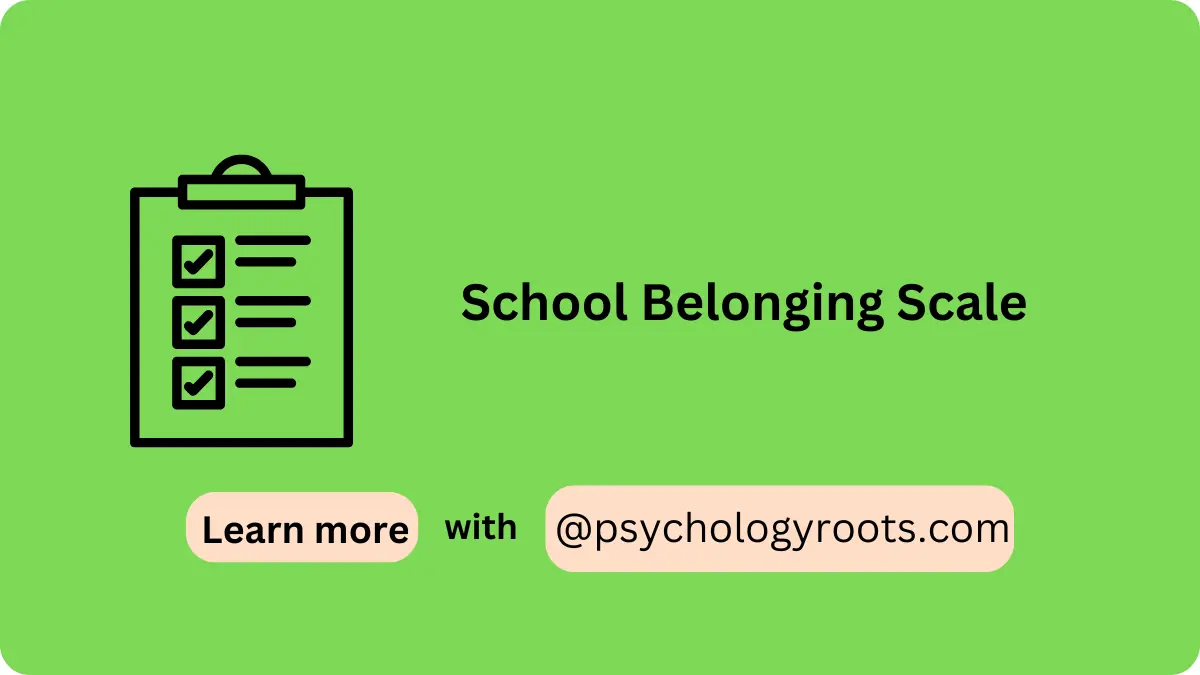Table of Contents
School Belonging Scale
Here in this post, we are sharing the “School Belonging Scale”. You can read psychometric and Author information. We have thousands of Scales and questionnaires in our collection (See Scales and Questionnaires). You can demand us any scale and questionnaires related to psychology through our community, and we will provide you with a short time. Keep visiting Psychology Roots.
About School Belonging Scale
Scale Name
School Belonging Scale
Author Details
Kelly-Ann
Translation Availability
English

Background/Description
The School Belonging Scale is a psychometric tool designed to measure the degree to which students feel connected to and valued within their school environment. Developed by Kelly-Ann Allen and colleagues in 2018, this scale highlights the critical role of school belonging in fostering students’ psychological well-being, academic success, and overall development.
Belongingness is a fundamental psychological need, and the school environment plays a pivotal role in meeting this need during adolescence. The School Belonging Scale assesses various dimensions of belonging, including relationships with peers, attachment to teachers, and identification with school values.
Widely used in educational research, this scale is particularly relevant for initiatives aimed at improving mental health outcomes, enhancing academic performance, and reducing dropout rates. Its robust theoretical grounding and user-friendly format make it a preferred choice for educators, psychologists, and researchers.
Administration, Scoring and Interpretation
- Obtain the School Belonging Scale through proper academic channels or by contacting the authors (drkellyallen@gmail.com).
- Explain the purpose: To measure students’ sense of belonging and connectedness to their school environment.
- Provide instructions: Participants rate items on a Likert scale, ranging from “Strongly Disagree” to “Strongly Agree,” based on their experiences at school.
- Approximate duration: Administration takes approximately 10-15 minutes.
- Administer the scale individually or in a group setting, ensuring a quiet and supportive environment for accurate responses.
Reliability and Validity
The School Belonging Scale demonstrates excellent psychometric properties. Studies have reported high internal consistency, with Cronbach’s alpha values exceeding 0.80. The scale’s validity is supported by its alignment with theoretical constructs of belonging and its predictive relationships with academic performance and mental health outcomes. Research by Allen et al. (2018) further validates the scale’s utility across diverse educational contexts.
Available Versions
Multiple-Items
Reference
Allen, K. A., Kern, M. L., Vella-Brodrick, D., & Waters, L. (2018). Understanding the priorities of Australian secondary schools through an analysis of their mission and vision statements. Educational Administration Quarterly, 54(2), 249-274.
Important Link
Scale File:
Frequently Asked Questions
What is the School Belonging Scale?
It is a tool used to measure students’ sense of belonging and connectedness within their school.
Who developed the scale?
The scale was developed by Kelly-Ann Allen and colleagues in 2018.
What does the scale assess?
It assesses dimensions of belonging, including peer relationships, teacher attachment, and alignment with school values.
How long does it take to complete the scale?
Approximately 10-15 minutes.
How is the scale useful in schools?
It helps identify areas for intervention to enhance students’ sense of belonging, improving their mental health and academic outcomes.
Disclaimer
Please note that Psychology Roots does not have the right to grant permission for the use of any psychological scales or assessments listed on its website. To use any scale or assessment, you must obtain permission directly from the author or translator of the tool. Psychology Roots provides information about various tools and their administration procedures, but it is your responsibility to obtain proper permissions before using any scale or assessment. If you need further information about an author’s contact details, please submit a query to the Psychology Roots team.
Help Us Improve This Article
Have you discovered an inaccuracy? We put out great effort to give accurate and scientifically trustworthy information to our readers. Please notify us if you discover any typographical or grammatical errors.
Make a comment. We acknowledge and appreciate your efforts.
Share With Us
If you have any scale or any material related to psychology kindly share it with us at psychologyroots@gmail.com. We help others on behalf of you.